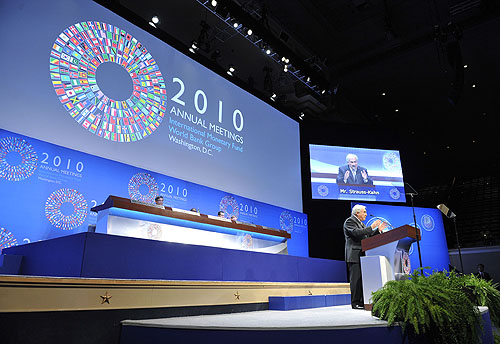|
 |
|
MORE EQUITABLE: IMF Managing Director Dominique Strauss-Kahn addresses the annual meeting of the IMF and the World Bank in Washington, D.C. on October 8. The recent agreement on a 6-percent quota shift will allow developing countries to play a bigger role in the IMF (ZHANG JUN) |
Finance ministers and central bank governors from the Group of 20 (G20) major economies agreed on October 23 to shift more than 6 percent of the International Monetary Fund (IMF) quotas to emerging or underrepresented countries. According to the agreement, signed in Gyeongju in the Republic of Korea, China's new quota in the IMF will be the third highest in the world.
"China, the biggest developing and low-quota country, should be promoted in terms of its quota and voting right in the IMF," Zhou Xiaochuan, Governor of the People's Bank of China, the country's central bank, said in Gyeongju.
After the IMF quota adjustment, China will hold 6.19 percent of IMF quotas. Before this, its quota was sixth among the IMF members, despite the fact that its total GDP was the world's third largest in 2009. China's 2010 GDP is expected to become the world's second biggest, exceeding Japan's. After a previous quota adjustment in 2006, China's quota increased to 3.72 percent from 2.98 percent.
Chinese analysts said the growing quota reflects China's increasing voice in the international economic system.
A historic change
Professor Shi Jianxun of the School of Economics and Management at Shanghai's Tongji University said China's share was also the third largest when it first co-founded the IMF in 1944. "Before the quota reform, China's shares had fallen to sixth among IMF members," he said. "This obviously didn't fit China's growing economic strength."
Shi said it means not just increased voting power, but also greater international responsibility. After the reform, China should be able to further strengthen cooperation with the IMF and play a constructive role in securing further rights for other emerging economies and developing countries. "A bigger quota can also improve China's position and influence in the world," said Shi, adding that China could make use of the IMF platform to create a better external environment for its own economic development.
This year's quota shift, as part of the IMF reform, was designed to maintain a balance between developed countries and developing countries. In recent years, emerging economies have been driving forces for the world economy. After the quota adjustment, Brazil, China, India and Russia are among the top 10 countries, in terms of IMF quotas.
At last year's G20 summit in Pittsburgh, the United States, plans were made to realize quota shifts of 5 percent from advanced countries to emerging markets, but the agreement at the Gyeongju conference called for a shift of more than 6 percent. Currently, there is roughly a 60/40 percent split in the shares at the IMF between advanced countries and developing countries.
Zhang Wenzong, an economist with the Chinese Academy of Social Sciences, said the quota increase for developing countries will give these economies a stronger voice in world economic development. In this way, the world economy can develop in a more balanced manner.
The IMF quota ultimately helps determine a country's voting power in the IMF, and such a shift highlights emerging economies' increasing power in the world economy.
"The 10 biggest shareholders in the IMF are those who deserve to be in the top 10, as they are the 10 most systemically important countries in the global economy," IMF Managing Director Dominique Strauss-Kahn said.
Strauss-Kahn considered the change "historic" and said it was the most important decision on the governance of the IMF since its creation.
"There will be other reforms, but what we did today puts an end to a discussion on legitimacy that had lasted for years, almost decades," he said at a press conference after the Gyeongju conference. The IMF reform should better represent the real global economy, he added.
A transfer of power
Shi said the IMF reform reflects changes in the world political and economic systems. "It is only a small step in the reform of the international monetary and financial system," he said.
Shi said the quota adjustment showed the IMF's economic power is now transferring away from the West and toward the emerging economies and developing countries, represented by Brazil, Russia, India and China. He said that, through the quota shift, their contributions to the world economy have finally been confirmed.
| 